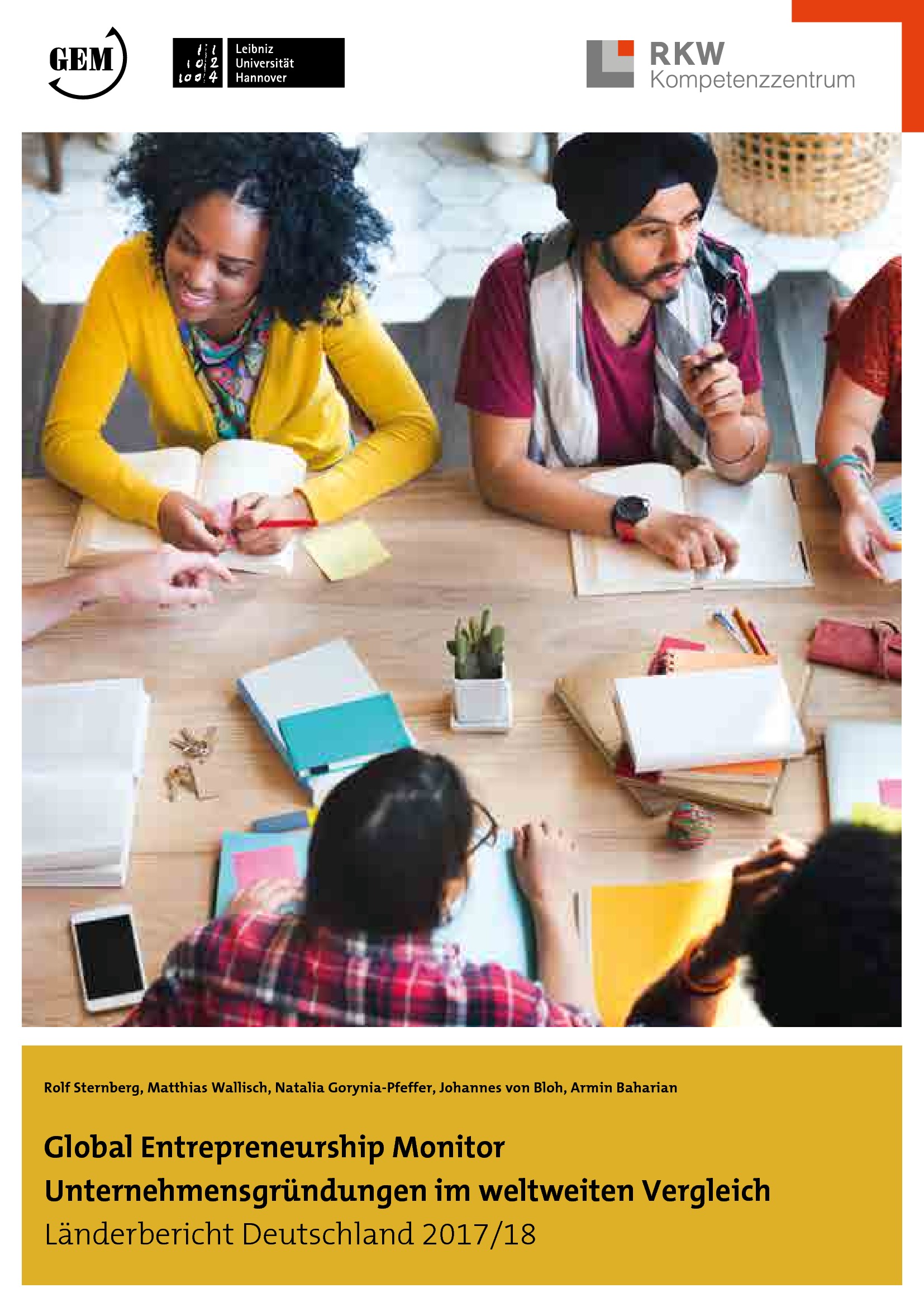Slight increase of entrepreneurial activities
In Germany, Total early-stage Entrepreneurial Activity (TEA) rate rose to 5.3 percent in 2017, 0.7 percentage points higher than in the previous year. During the same period, the TEA rate has fallen in reference countries such as Poland, Ireland or the Netherlands. That’s why cautious optimism seems appropriate. Whether the results mark a turning point in the development of entrepreneurial activities in Germany, remains to be seen. From an international perspective, during the last two decades entrepreneurial activity Germany was relatively low. In comparable countries with an innovation based economy, such as Canada or Estonia, TEA rate is around 20 percent.
Are entrepreneurial activities a matter of age? Not in Germany
Age categories provide important insight into the overall entrepreneurial process. This report compares the entrepreneurial activities of young people (18-24 years) with those of older people (55-64 years). With a TEA of 3.37 % for both, there are no visible differences between these two groups. Due to demographic change, older people represent a relatively large and growing part of the population in Germany, which leads to 55-64 year-olds potentially having a strong influence on the overall entrepreneurial activity.
Seven times more opportunity driven start-ups than necessity driven start-ups
Looking at the motive for establishing new businesses , the ratio of opportunity driven to necessity driven new businesses is close to 7:1, which is the highest quota ever measured in Germany. Compared with the ratio of other innovation-based countries, Germany ranks fourth. The deciding factor for this positive result is the high rate of opportunity orientation in the entrepreneurial process. In this context, the development of opportunity driven start-ups is also important: they show stronger growth compared to necessity driven start-ups and enjoy a longer life in the marketplace.
Many migrants are opportunity-driven entrepreneurs
The comparison of migrants with the indigenous population shows, that non-German-born people have an above average TEA of 6 percent. Especially during the first seven years after their arrival in Germany, migrants show a particularly high TEA. The difference in the entrepreneurial activities between non-German-born men and women is less pronounced than among native German founders. Three-quarters of migrant founders start their businesses to take advantage of market opportunities and not because of limited employment alternatives. In addition, the social and economic relations to their home country can contribute to knowledge transfer. Overall, migrants contribute to the German economy not only through their above-average number of start-ups, but also through the quality of their entrepreneurial endeavors.
German founders often focus on the national market
Start-ups are often associated with job creation. Compared to other countries, founders in Germany are more "cautious" in this regard. 70 percent of founders expect to create at least one job within the first five years or have already hired one employee. This figure is relatively low by international standards. The growth potential of start-ups is related to the export orientation of entrepreneurial activities. Here, Germany performs poorly. Founders in Germany focus mainly on the national market. Only 2 percent of all start-ups expect foreign sales of at least 75 percent. This is the lowest figure of all innovation-based countries.
The public perception of entrepreneurial opportunities rises
A positive development is evident in the perception of entrepreneurial opportunities. 42 percent of people interviewed recognized good opportunities for starting a business in the region they live in over the next six months. This figure has increased significantly in recent years and reached its highest value yet in 2017. This result gives reason to hope for rising entrepreneurial activity in Germany. However, the perception of one's own entrepreneurial competencies could work as a limiting factor in this context. Only 37 percent of respondents believe that they have sufficient expertise to start a business. Compared with other innovation-driven countries this is a below-average result.
Good infrastructure, poor entrepreneurship education
The institutional environment for entrepreneurship in Germany has specific strengths and weaknesses which have not changed much in recent years. Among the positively assessed entrepreneurial framework conditions are physical infrastructure, consumer and business attitudes towards innovation, intellectual property protection and public support initiatives. New businesses also benefit from a broad range of consultants and service providers. In these fields, Germany offers a good environment for new ventures.
However, according to the experts interviewed for this survey the majority of the framework conditions leaves room for improvement. Above all, entrepreneurship education receives particularly bad ratings. The area of regulation and taxation has also been assessed as poor with regard to the development of entrepreneurial activities. In addition, the social values and norms are not seen as supportive factors for an entrepreneurial culture in Germany.
In the international comparison of the institutional environment, eight out of twelve evaluated framework conditions in Germany are below the mean value of the innovation-based countries. The poor assessments of entrepreneurial culture and of entrepreneurial education are also evident in comparison to the reference countries. This leads to a relatively low attractiveness of the German ecosystem.
Missing role models for female entrepreneurs
With regard to entrepreneurial activities of women, the interviewed experts see good chances to reconcile working and family life on the basis of existing care services for children and other dependents. However, missing models for female entrepreneurs and the lack of opportunity for starting a new business in the engineering fields are considered as problematic. Especially if Germany is to master the challenges of digitization, women need to be involved more strongly in entrepreneurial activities.
The company succession as an option for entrepreneurial activities is little known and poorly publicized
The overall rating of the framework conditions for company succession is positive. According to the interviewed experts, financing programs and matching formats offer good chances to effectively organize company succession. However, the perception in society of company succession as an option for potential entrepreneurs is rated negatively by more than half of the experts.


